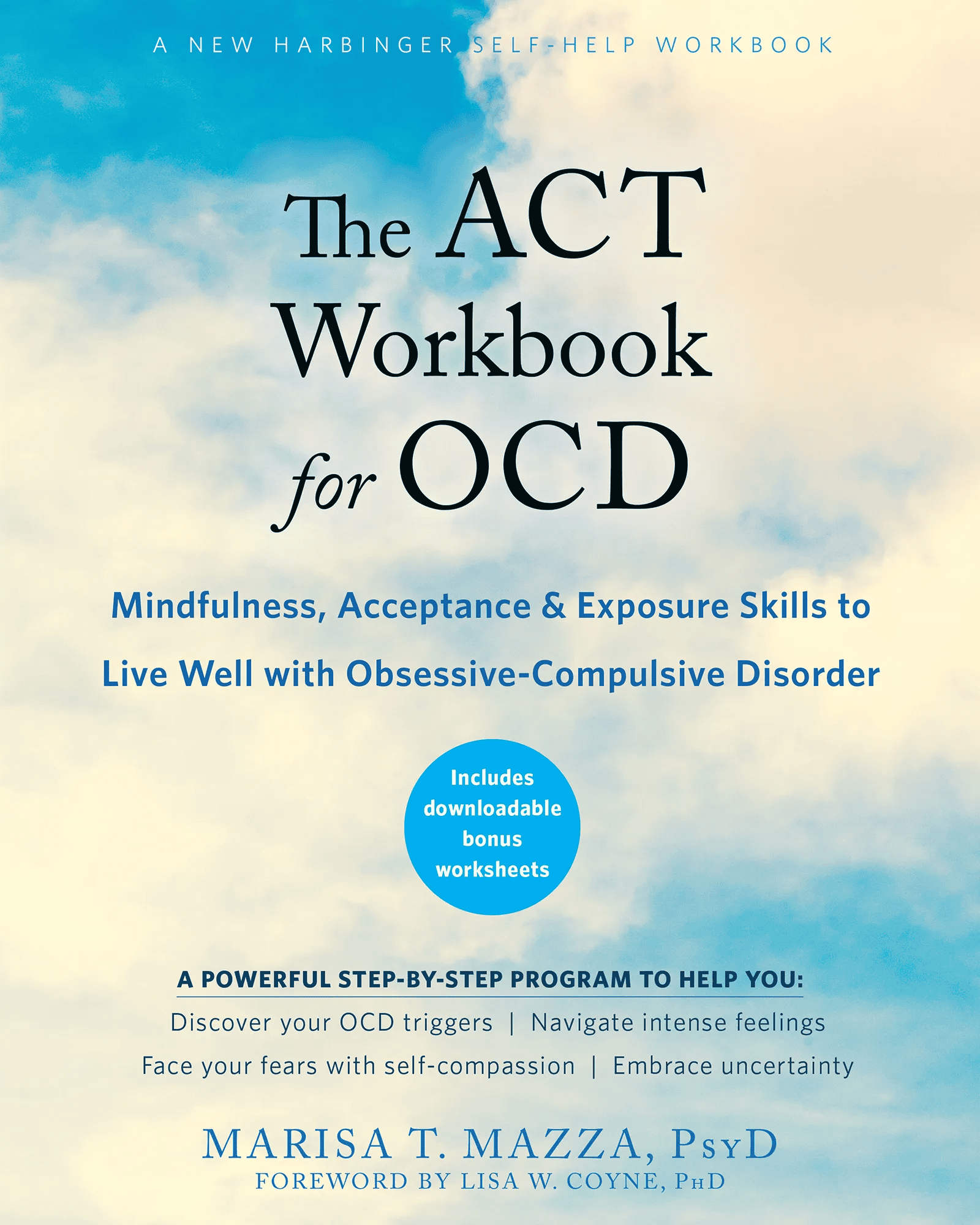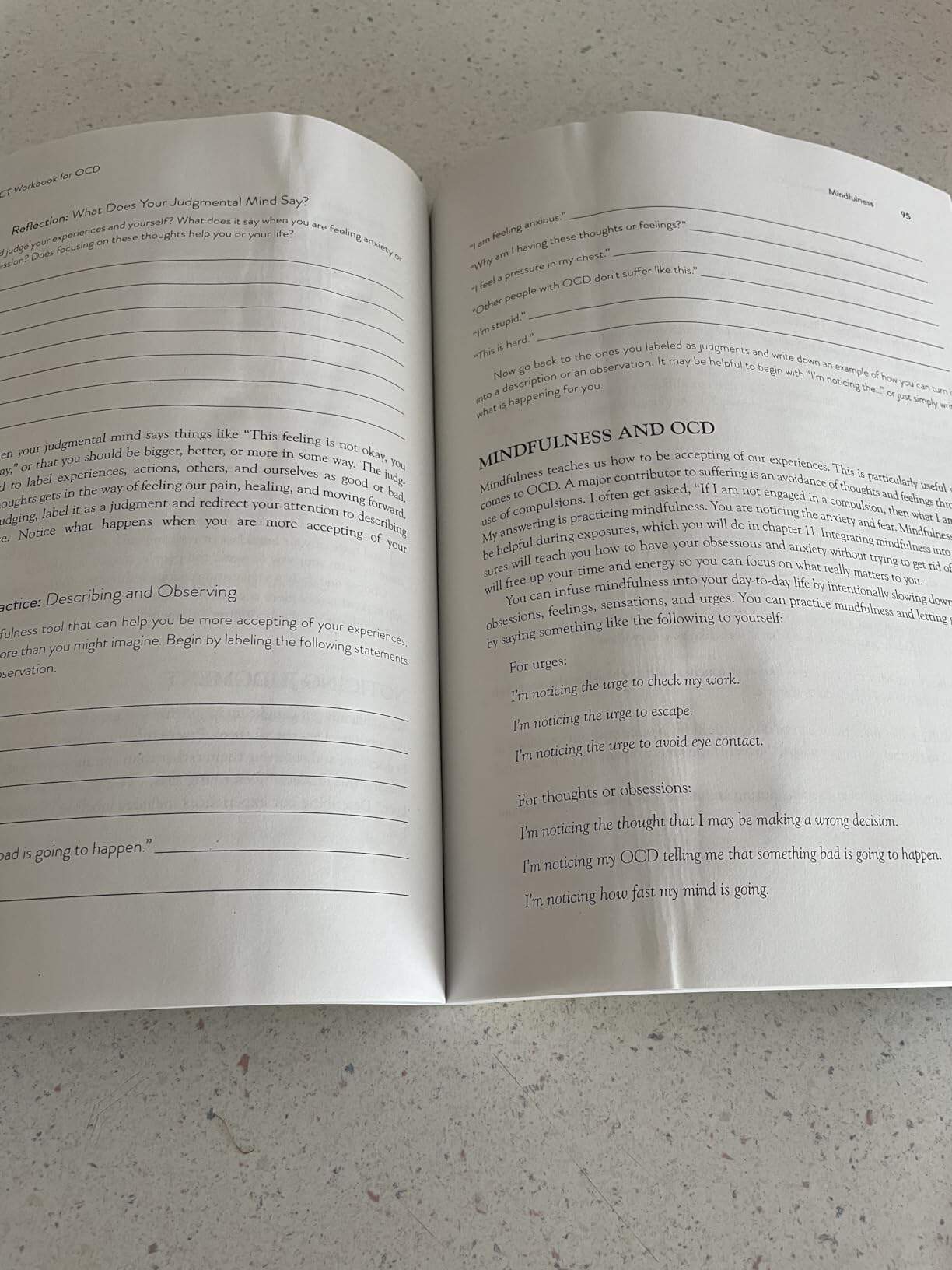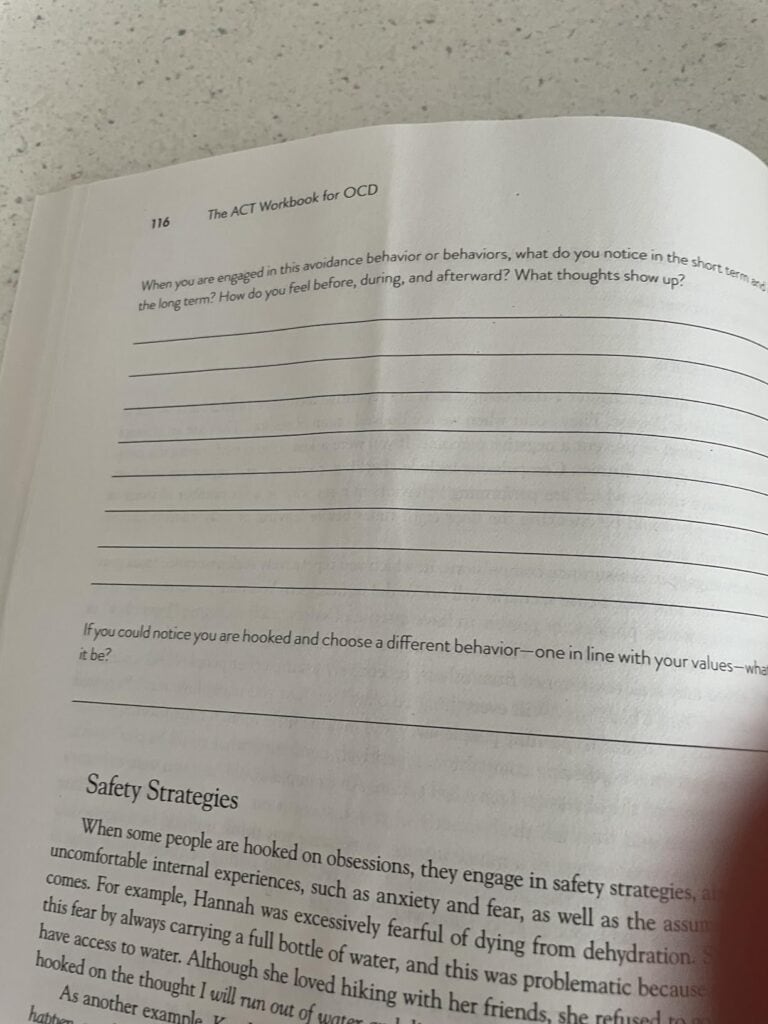A Comprehensive Guide to Overcoming OCD with “The ACT Workbook for OCD”

Obsessive-Compulsive Disorder (OCD) is a mental health condition that affects millions worldwide.
While traditional treatment approaches like cognitive-behavioral therapy (CBT) and response prevention (ERP) have been effective, Acceptance and Commitment Therapy (ACT) offers a promising alternative.
In “The ACT Workbook for OCD” by Marisa T. Mazza (licensed clinical psychologist) readers embark on a journey of self-discovery and healing, utilizing the principles of ACT to confront and overcome OCD’s grip.
This review aims to dissect the book’s contents, explore its efficacy, and provide insights for potential readers seeking relief from OCD’s torment.
Overview of the Book
“The ACT Workbook for OCD” is structured to guide individuals through the core tenets of ACT, tailored specifically to address OCD.
The book is divided into user-friendly sections, each focusing on a crucial aspect of the therapeutic process.
From understanding OCD’s mechanisms to implementing mindfulness techniques, Mazza provides a comprehensive roadmap for readers to navigate their journey toward recovery.
Understanding OCD through an ACT Lens
Mazza begins by unraveling the complexities of OCD through the lens of ACT.
Readers are encouraged to adopt a stance of acceptance toward their obsessive thoughts and compulsive or ritualistic behaviors, recognizing them as mere byproducts of their mind’s workings rather than definitive truths.
By fostering an attitude of mindfulness, individuals can disengage from the struggle against their obsessions and instead focus on aligning their actions with their deepest values.
Defusing Cognitive Fusion
Cognitive fusion, the entanglement of thoughts with reality, lies at the heart of OCD’s tyranny.
Mazza introduces practical exercises used in cognitive therapy and individual therapy practice to help readers detach from their thoughts, viewing them as passing mental events rather than accurate reflections of reality.
Through techniques like cognitive defusion and diffusion, individuals learn to loosen the grip of intrusive thoughts, reclaiming control over their minds.
Embracing Psychological Flexibility
Central to ACT is the concept of psychological flexibility – the ability to adapt and respond effectively to life’s challenges.
Mazza illustrates how rigid attempts to control or suppress obsessions only exacerbate OCD’s grip, trapping individuals in a cycle of anxiety and avoidance.
By cultivating such behavior therapy, readers learn to embrace discomfort and uncertainty, freeing themselves from OCD’s shackles using effective treatment.
Mindfulness Practices for OCD

Mindfulness serves as a cornerstone of ACT, empowering individuals to engage fully with the present moment.
Mazza introduces various mindfulness exercises tailored to address OCD’s specific challenges, such as the “Leaves on a Stream” technique for observing intrusive thoughts without attachment.
Through regular practice, readers develop a heightened awareness of their internal experiences, fostering greater resilience in the face of OCD’s onslaught. These exercises can also be effective for other related disorders such as various anxiety disorders.
Values Clarification and Commitment
At the heart of ACT treatment lies the pursuit of a meaningful life guided by one’s core values.
Mazza prompts readers to reflect deeply on their values and aspirations, identifying what truly matters to them beyond the confines of OCD and associated anxiety.
Armed with this clarity, individuals are encouraged to commit to actions aligned with their values, even in the presence of discomfort or uncertainty.
By reclaiming agency over their lives, readers transcend the limitations imposed by OCD, forging a path toward fulfillment and authenticity.
Experiential Exercises and Worksheets

Throughout “The ACT Workbook for OCD”, Mazza intersperses experiential exercises and worksheets designed to facilitate self-reflection and application of ACT principles.
From thought records to values clarification exercises, readers are invited to actively engage with the material, integrating it into their daily lives.
These hands-on activities serve as invaluable tools for fostering insight and fostering lasting change.
Practical Strategies for Daily Living
In addition to theoretical frameworks and experiential exercises, Mazza provides practical strategies for managing OCD symptoms in everyday life.
From setting realistic goals to creating exposure hierarchies (exposure therapy), readers are equipped with a diverse array of contextual behavioral science tools to navigate the challenges posed by OCD.
Mazza’s compassionate guidance and evidence based interventions presented offer hope and empowerment to individuals grappling with OCD’s pervasive impact.
Case Studies and Real-Life Examples
To illustrate the application of ACT principles in real-world contexts, Mazza incorporates case studies and vignettes throughout the workbook.
These narratives offer glimpses into the lived experiences of individuals navigating the complexities of OCD, highlighting the transformative power of ACT (with an ACT therapist) in fostering resilience and growth.
By showcasing diverse paths to recovery, Mazza instills hope and inspiration in readers embarking on their own journey toward healing and effective OCD treatment.
Final Verdict – The ACT Workbook For OCD
“The ACT Workbook for OCD” by Marisa T. Mazza stands as a beacon of hope for individuals grappling with the debilitating effects of OCD.
Through its compassionate guidance, evidence-based strategies, and practical exercises, the workbook empowers readers to confront their obsessions and compulsions with courage and resilience.
By embracing the principles of ACT, individuals reclaim agency over their lives, forging a path toward freedom and authenticity.
For anyone seeking relief from OCD’s torment, Mazza’s workbook offers a roadmap to healing and transformation.




